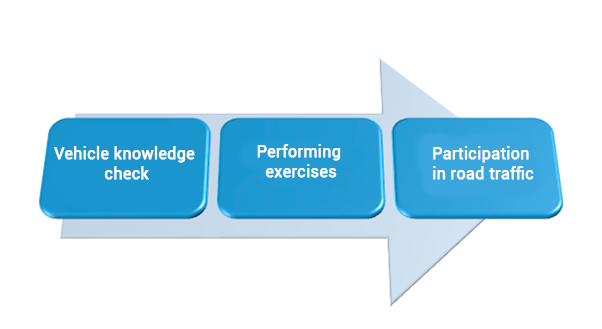Obtaining a driver's license in Latvia
To
obtain a International driving license in Latvia, you need to go through several
procedures that are familiar to anyone who already drives a car. The
specificity of the Latvian moments that determine the success of driving
training is presented in detail in this article. Let’s try to figure
out where to start, how much it will cost, and how long it will last.
If you already have a driver’s license
When
a person obtains a residence permit in Latvia, he can’t drive a car
until exchanges his previous national driver’s license for Latvian one –
of European type. At the same time, it’s not necessary to study in a
driving school. Similarly, you don’t need to pass a theoretical exam.
However, a medical examination and a driving test are not circumvented.
Medical
examinations in Latvia are passed at the address indicated in the local
(municipal) driver’s license office – CSDD. Only 35 euros and 20
minutes – and you don’t even have to take the result – it will
immediately be added to a special CSDD database. Then you should pay
about 30 euros and sign up for a driving test. Success in the latter
guarantees you the issue of a Latvian driver’s license of the European
type for a period of ten years. But you will have to pay again for the
license form (card) – approximately 30 euros. Nevertheless, the category
is automatically prolonged, for example, A (if the exam is taken for
category B). It’s very convenient.
If you get a driver’s license for the first time
Of
course, in this case, you start with training in a driving school. The
cost of theoretical lectures starts from 500 euros. At the same time,
driving school classes are strictly required. You mustn’t be late and
leave classes earlier. Such severity is connected with the fact that
sometimes CSDD officials check the attendance at a driving school, and
if the number of trainees in fact turns out to be less than stated in
online registration at the beginning of a lesson, a driving school can
be fined and deprived of a training license. Therefore, you should
immediately encourage yourself to necessarily attend all classes for
usually five weeks or about one and a half months (twice a week).
Also,
for 30 euros, a driving school provides three printed manuals (with
road signs, questions and rules). Before you begin training, you
conclude a contract for it. Then should take a first aid course (without
a certificate of these courses completion, which is valid for five
years, you are not allowed to attend theoretical studies). The first aid
courses teach you the algorithm of action in case of accidents and car
crashes, tell about the use of the car first-aid kit contents, etc.
Next,
you take the physical examination, which was described above. CSDD
issues a temporary driver’s license (it is called white in Latvia). But
it’s impossible to start driving practice with this license until all
theoretical classes have been completed and the theory exam has been
successfully passed. Only after that you can choose your own instructor
and within 20 hours learn the wisdom of driving. But if a trainee in a
driving-school car is stopped by traffic policemen and doesn’t have a
white license, the fine will be 60 euros. In addition, every hour of
driving costs 25 euros – so trainees study conscientiously.
How to pass a practical driving test
When
all classes with an instructor are completed and a training card with a
note about it is received, you sign up for a driving exam. On the day
of the exam, you come to the training center. You must pass driving test
yourself through driving a vehicle of the appropriate category. During
the exam, the inspector checks whether the trainee observes and fulfills
the requirements, moving in the traffic flow, or not.
Driving test itself consists of the following components:

The
instructor who taught the trainee has no right to take part in the
exam. During the whole period of practical driving, there is a video
fixation in the car.
The driving test consists of two parts, each of them lasts 30 and 90 minutes:
–
the first part – the applicant confirms his knowledge about the
placement of cargo in a vehicle or ensuring passenger comfort, the
principles of ergonomics and the driver’s action after a traffic
accident, and also performs exercises;
–
the second part – the applicant drives the vehicle along the route,
which includes various roads in built-up areas, as well as roads on
which the maximum allowed speed is at least 90 km/h.
During
the driving test, the inspector assesses the applicant’s skills and his
ability to drive a vehicle and safely participate in traffic. The
inspector assesses driving in general and takes into account the general
impression of the applicant, which is created by a confident driving,
taking into account road and weather conditions, as well as other road
users (especially those who are less protected)
apply on this link https://www.e-itca.org/
Comments
Post a Comment